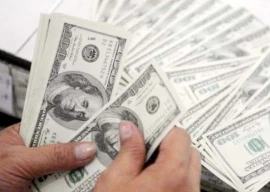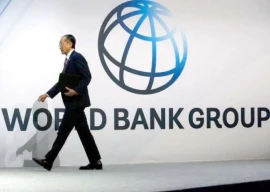
It is an interview that created quite a stir: Mian Muhammad Mansha, Pakistan’s richest man, was quoted by India’s Economic Times as saying that his MCB Bank would be venturing into India. Mansha sounded optimistic about the financial crossing of the Wagah, but will MCB Bank be able to make money? A closer examination of the numbers by The Express Tribune reveals that the Indian banking market is not as attractive as it seems from the outside.
At an initial glance, the Indian banking market is phenomenally attractive. Deposits at all commercial banks were an astonishing Indian Rs52 trillion ($938 billion) in 2011, according to the Reserve Bank of India (RBI), and growing at 18.4%, faster than the approximately 15% growth rate in Pakistani bank deposits. Despite the recent slowdown, the Indian middle class remains one of the largest in the world and likely to continue growing at a much faster pace than Pakistan.
But while those numbers are important for a bank to look at, the real numbers to pay attention to are a little different, and do not often grab the headlines. Statistics such as net interest margin (the difference between what banks pay to their depositors and what they collect from their borrowers), return on assets and return on equity are far more relevant to the decision to invest.
On those fronts, the Indian market may not be as lucrative as it appears at first glance, at least not for new entrants into the market, especially foreign banks. For starters, the average net interest margin earned by banks in India was 2.92% in 2011, much lower than the Pakistani average of over 7.5% during that same period, and lower even than the 7.8% earned by MCB Bank itself during the year, according to the bank’s financial statements.
It is true that foreign banks in India earn a higher net interest margin, which was about 3.86% in 2011, according to the RBI’s statistics. Yet they also face a higher intermediation cost, which is the ratio of operating expenses to total earning assets of the bank. For foreign banks in India, that ratio came to 2.71% in 2011, compared to the Indian average of just 1.86%, although the average for foreign banks in India is actually lower than the 2.98% average for MCB Bank during that same year.
Nonetheless, Mian Muhammad Mansha, chairman of the Nishat Group – a diversified conglomerate that has interests in cement, textiles, and energy as well being the majority shareholder of MCB Bank – may want to look at just one more statistic before he makes the decision to take the plunge in the Indian market.
As the fourth largest bank in the country by assets, MCB has a commanding presence in Pakistan and an ability to leverage its balance sheet to deliver strong shareholder returns. While average return on equity for Pakistani banks was about 15%, MCB Bank earned a 26.2% return on equity. By contrast, foreign banks in India earn an average return on equity of about 10.3%, lower than the Indian average of about 15% in 2011.
Foreign banks – even global financial powerhouses – have found India a difficult market to crack. Barclays recently sold off its retail branch network in the country to Standard Chartered Bank and even some established global brand names in the banking business have been struggling in India. MCB Bank will have to be careful to ensure that its luck is different from these institutions.
It is entirely possible, however, that the application to open branches in India (MCB wants to open three) is just a bid to increase its ability to finance what it expects will be rapidly growing trade between India and Pakistan. MCB Bank has a sizeable trade finance business, but mid-sized banks such as Bank AL Habib, Habib Metro Bank, and others have been rapidly growing their market share. A foothold in India may help MCB protect its share in the pie.
Published in The Express Tribune, July 19th, 2012.
COMMENTS (12)
Comments are moderated and generally will be posted if they are on-topic and not abusive.
For more information, please see our Comments FAQ

1732020599-0/BeFunky-collage-(73)1732020599-0-165x106.webp)
1731926127-0/zayn-(1)1731926127-0-165x106.webp)
1732018399-0/BeFunky-collage-(72)1732018399-0-165x106.webp)













An analysis without references.. It is piece not worthy to consider
@Tahir: His decision to marry into the Saigols was also a business venture. Good business man, low on the moral and ethical side in my opinion
Net interest margin of 3% is treated as the normal one and tough competition will not allow you to earn more than that particularly in financing. other activities of the bank like merger consultancy and other fee based income alone can increase the net interest margin. But with the increase in Indo Pak trade there lies the potentiality,
They should try to succeed in Pakistan first. I sent money through Moneygram to Karachi for someone's daughter was getting married soon. I checked through Moneygram's website all the listed agents and found an MCB branch closest to the receiver's home. The reciever, a widowed lady, went to collect the money and she was told her reference number is wrong! A woman working there told her she should go to their Hyderi Branch if she wants it in cash. She came back home, we talked, turned out the reference number was right. I told her of a few other Moneygram agents. She went again, this time, to Hyderi branch, and was told again the reference number was wrong. Finally, she went to Bank Al-Habib and collected it from there.
What boiled my blood is that Moneygram ensure you the reciever can collect money after 10 minutes. God forbid, if someone needs the money for an emergency, and this is what the businessmen and banks in Pakistan are going to do, what is going to happen? Who is accountable for it? They can be unprofessional in Pakistan because it is a lawless land, but if they go to other countries to invest, are they going to treat people the same way?
This is why, I have noticed, that plenty of people of Pakistani origin own businesses around the world, yet hardly anyone makes it to the mainstream. I am not proud of saying this but they can be very dishonest and unprofessional.
MCB Bank, the parent of the porposed Indian MCB venture, will have one of the lowest credit rating of any bank operating in India, by the virtue of the fact that banks reflect the ratings of their parent country—and Pakistan's rating is at the junk level.
The question is also whether it will get permission to operate under the MCB name because that abbreviation also stands for the Mauritius Commercial Bank.
In India margins are low and local banks are sharp. In such a market even international players such as Germany's Dresdner left, but a Pakistani bank, with limited resources, a junk rating and a confusing name (which actually still stands for Muslim Commercial Bank) wants to succeed? Let us hope it will not be a money-laundring business or a Ponzi scheme.
The last such "cleaning" bank was the Pakistani-owned BCCI Bank (Bank of Credit and Commerce International), registered in Luxembourg, and operating out of London and Karachi. The bank's founder, Agha Hasan Abedi—who died in Pakistan of a heart attack, was under indictment in several countries for crimes related to BCCI.
I am going to borrow from it and then declare myself bankrupt... :-)
well i am sure indians will be aprehensive about trusting any pakistani, banking is all about sentiment (trust)
@anwar: for your information, MCB is no more "Muslim Commercial Bank", it is just MCB Bank.
Reference: In 2005, the management of the bank abbreviated its name from Muslim Commercial Bank Limited to MCB Bank Limited to explore international markets; they were facing resistance due to the word Muslim especially from Western Countries to avail license. In 2008 the head office of MCB was shifted from Karachi to Lahore in a newly constructed building, namely MCB House located at Sharea Ghous-ul-Azam, commonly known as Jail Road.
Source: Wikipedia.
@anwar: What do you mean by misusing the word Muslim. It is very good to start a business in India and open up another avenue for our nations to forge true friendship grounded on economic growth. Well done Mian Mansha.
Net interest margins of Indian banks are lower than the banks in Pakistan as Indian customers have to be paid interest on the deposits , which is perhaps not the case in Pakistan where Islam does not permit interest payment . I would tend to agree with the author that MCB in the absence of a large branch network will find the going tough in India ,if it ventures in to retail banking , which appears to be its main stay in Pakistan .
In the initial years of if it however participates in financing and facilitating Indo-Pak trade I see no reason why the Bank should not do well in India .
Mansha just wants to misuse the word "Muslim" like he did in Pakistan
Deat ET,
The man is the richest one in Pakistan and he has become the richest because he has been able to make correct decisions. The guy has brains. If the writer thinks that Mansha didnt consider the above factors, then it is too naive and immature of him to think of it. After all, he is the richest because of a reason. he has been able to foresee and act on opportunities. if the writer thinks he can outthink Mansha, then give him a reality check please.